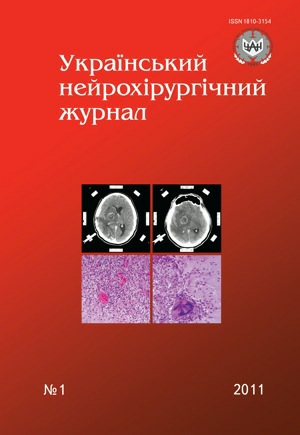The influence of syndromes of system inflammatory response and poliorganic insufficiency on purulent-inflammatory complications frequency at patients with cranio-cerebral trauma
DOI:
https://doi.org/10.25305/unj.58474Keywords:
cranio-cerebral trauma, purulent-inflammatory complications, syndrome of systematic inflammatory response, syndrome of poliorganic insufficiency, deescalative therapyAbstract
The development of purulent-inflammatory complications (PIC) at patients with cranio-cerebral trauma (CCN) is promoted by syndromes of system inflammatory response (SSIRS) and poliorganic insufficiency (SPI), their signs are detected in first hours after trauma. PIC, in their turn, promote SPI development. The influence of early SSIRS and SPI on frequency of PIC at CCT is studied not enough.
227 injured persons with CCT were inspected. In 60.5% of them PIC was revealed with respiratory system disorder, in 13% — from CNS, in 9.9% — sepsis, in 16.5% — combined complications.
PIC frequency sufficiently depended on CCT severity, accompanied diseases, SSIRS and SPI, expressiveness of CNS functions disorders, and in less degree — alcohol concentration in blood.
Presence of two and more signs of early SPI the risk of PIC increases twice, two and more signs of SSIRS — in 2.4 times, that grounds early deescalative therapy expedience and let decrease lethality of patients with CCT because of PIC from 22 to 12.3%, the pneumonia frequency — from 60.5 to 47%.
References
Зильбер А.П. Полиорганная недостаточность как новый вид патологи: клиническая физиология, интенсивная терапия, профилактика / А.П. Зильбер // Актуальные проблемы медицины критических состояний. — 2000. — №7. — С.71–91.
Кижаева Е.С. Полиорганная недостаточность в интенсивной терапии / Е.С. Кижаева, И.О. Закс // Вестн. интенсив. терапии. — 2004. — №1. — С.14–18.
Черний В.И. Роль синдрома системного воспалительного ответа в патогенезе травматической болезни головного мозга / В.И. Черний, Г.А. Городник // Біль, знеболювання і інтенсив. терапія. — 1998. — №3(4). — С.50–54.
Роль системно-воспалительного ответа и полиорганной недостаточности в исходе лечения больных с тяжелой черепно-мозговой травмой / Л.П. Чепкий, С.В. Минов, С.А. Андреев [и др.] // Матеріали IV з’їзду нейрохірургів України (м. Дніпропетровськ, 27–30 трав. 2008 р.). — Днепропетровск, 2008. — С.183.
Варианты лечения критических состояний с учетом патогенеза SIRS-синдрома системного воспалительного ответа / В.П. Шано, Ф.И. Гюльмамедов, А.Н. Нестеренко [и др.] // Анестезиология, реаниматология. — 1997. — №6. — С.48–53.
Smail N. Role of systemic inflammatory response syndrome and infection in the occurrence of early multiple organ dysfunction syndrome following severe trauma / N. Smail, A. Messiah, A. Edouard // Intens. Care Med. — 1995. — V.21, N10. — P.813–817.
Bone R.C. A personal experience with SIRS and MODS / R.C. Bone // Crit. Care Med. — 1996. — V.24, N8. — Р.1417–1418.
Multiply organ failure: pathophysiology, prevention, and therapy: eds. A.E. Baue, E. Faist, D.E. Fry. — N.Y.: Springer-Verlag, 2000. — P.420–437.
Barton R. The hypermetabolizm multiple organ failure syndrome / R. Barton, F. Cerra // Chest. — 1989. — N5. — Р.115–116.
Особенности мультиорганной недостаточности при тяжелой черепно-мозговой травмой / Л.П. Чепкий, С.А. Андреев, С.В. Минов, Р.В. Гавриш // Біль, знеболювання і інтенсивна терапія. — 2008. — №2(Д). — С.328–330.
Downloads
Published
How to Cite
Issue
Section
License
Copyright (c) 2011 Sergiy Minov, Leonard Chepkiy, Ruslan Gavrysh

This work is licensed under a Creative Commons Attribution 4.0 International License.
Ukrainian Neurosurgical Journal abides by the CREATIVE COMMONS copyright rights and permissions for open access journals.
Authors, who are published in this Journal, agree to the following conditions:
1. The authors reserve the right to authorship of the work and pass the first publication right of this work to the Journal under the terms of Creative Commons Attribution License, which allows others to freely distribute the published research with the obligatory reference to the authors of the original work and the first publication of the work in this Journal.
2. The authors have the right to conclude separate supplement agreements that relate to non-exclusive work distribution in the form of which it has been published by the Journal (for example, to upload the work to the online storage of the Journal or publish it as part of a monograph), provided that the reference to the first publication of the work in this Journal is included.









